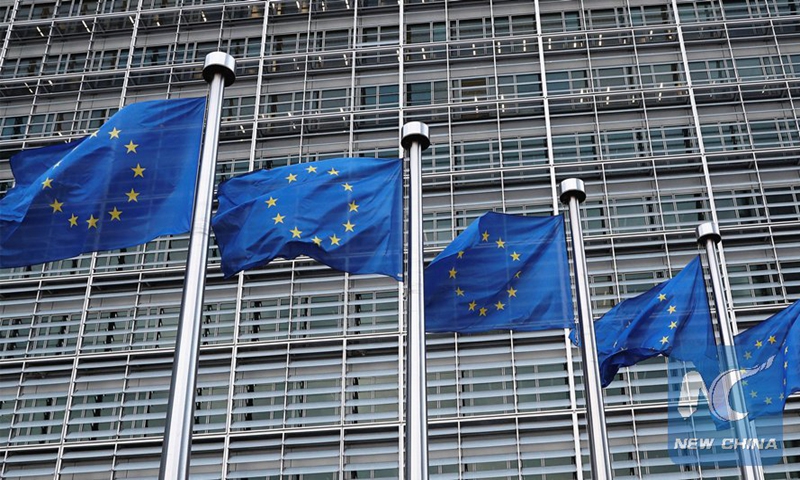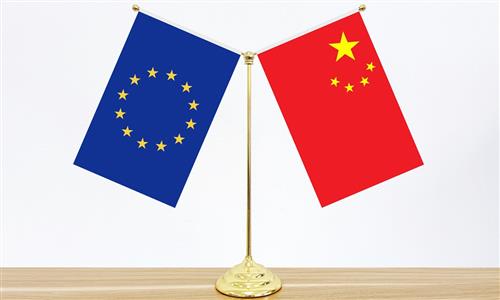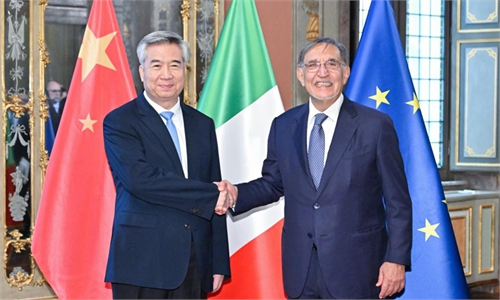
The European Union flags in front of EU headquarters in Brussels, Belgium. Photo: Xinhua
Imposing sanctions and engaging in trade wars does not align with China's interests, nor with the EU's interests, a Chinese observer said on Sunday, describing the complexity of China-EU relations like that of a "wrangling married couple."
Speaking at an event in Shanghai, EU Ambassador to China Jorge Toledo said that "The EU does not want a trade war with Beijing but five years of talks have yielded no real progress," adding that there is increasing concern over Chinese market access for European medical devices, according to Reuters.
Toledo made the remarks at the 30th anniversary celebration of the China Europe International Business School. Toledo said talks with European medical device makers had shown they were being discriminated against in Chinese public procurement. "We don't want a trade war. We just want transparency. We want a level playing field," Reuters cited Toledo as saying.
Trade frictions between the bloc and China have intensified over the past year after the EU launched an investigation into Chinese-made imports of electric vehicles (EVs) that prompted Beijing to launch probes into Europe's pork and dairy industries and curb brandy imports, Reuters reported.
Zhao Junjie, senior research fellow at the Institute of European Studies at the Chinese Academy of Social Sciences, told the Global Times on Sunday that the overall characteristic of China-EU relations in the post-pandemic era is the emergence of trade protectionism, while at the same time, there is positive momentum in economic and trade cooperation, technological collaboration, cultural exchanges and educational partnerships. These elements consistently act as stabilizers or catalysts for bilateral progress.
"The China-EU relationship is much like a married couple wrangling with each other. Both recognize they should work out their issues together, and no matter who wants to break up, both will suffer significant losses," Zhao said.
The European Commission recently concluded its anti-subsidy investigation by imposing definitive countervailing duties on imports of battery electric vehicles (EVs) from China for a period of five years.
As Republican presidential candidate Donald Trump won the 2024 US presidential election, the EU will need to address the short- or long-term challenges following Trump's reelection, Christian Kern, former Chancellor of Austria said at an event on Friday in Beijing. The foremost is to solve energy-related issues, an area where the EU is able to cooperate with China, Kern said. Kern believes that China can rapidly scale industries, such as new energy vehicle batteries and wind power, while Europe is at a relatively lagging position.
Both Zhao and Yan told the Global Times that China and the EU should prevent the EU's strategic autonomy from moving toward confrontation with China, and called for more open communication between China and the EU.
Yan noted that the EU needs to recognize that the retaliatory measures China has taken are not solely focused on tariffs for EVs. There are concerns about potential tariff increases in other sectors such as wind turbines, solar energy, medical equipment and more, he said.
Several European leaders have visited China recently. "These visits are essential. Open communication and dialogue can help avoid misjudgments," Yan noted.
Zhao emphasized that "China opposes unreasonable demands and will fight when necessary. However, countermeasures should be differentiated and not applied uniformly."



